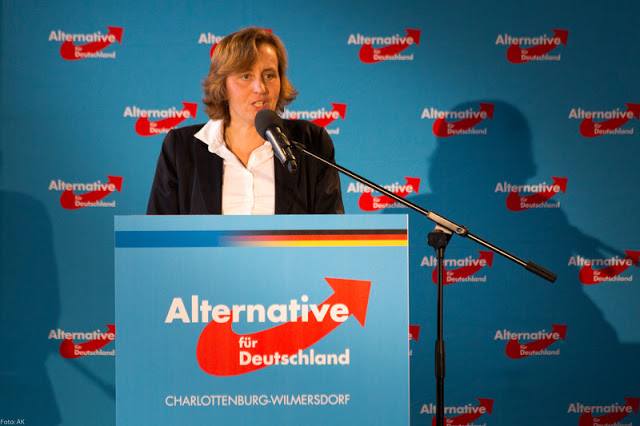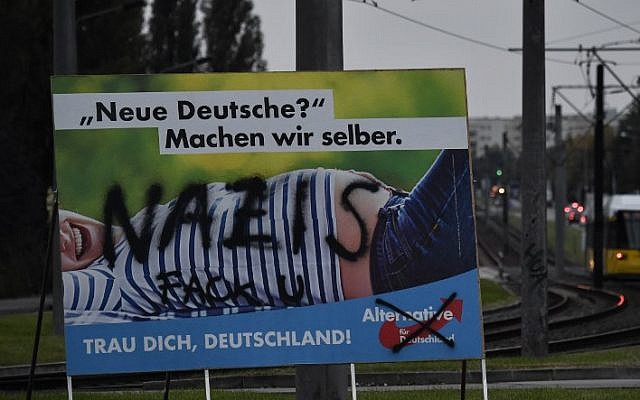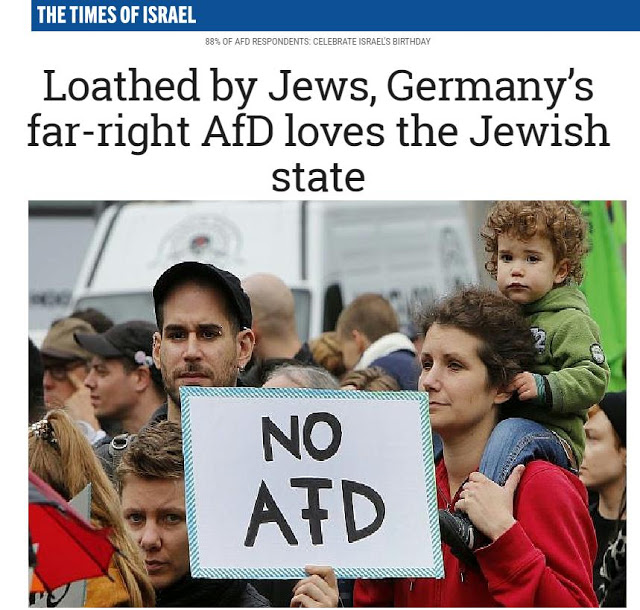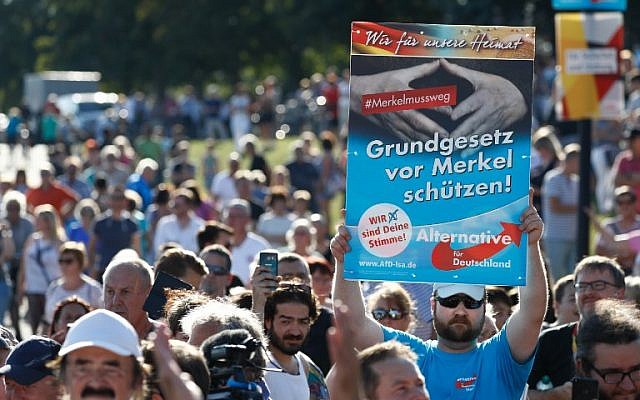and neo-Nazism
Germany where Alternative for Germany, a neo-Nazi party, has become the third
largest party in the Bundestag with nearly 100 seats and 13% of the vote. ‘Loathed
by Jews, Germany’s Far-Right Loves the Jewish State’.
Perhaps one correction to the headline is in order.
There is nothing ‘Jewish’ about Israel except that being Jewish means you are part of the herrenvolk, the master race, that group
of society which has, because of its ethnic-religious characteristics
privileges. In that sense and only in
that sense Israel is a Jewish state.
state and that Israel is a continuation of ‘Jewishness’ over the ages they
could not be more wrong. Jewish identity
has changed many times over the centuries.
It is no more fixed than Islamic or Christian identity has been.
although it is nationalist, a crucial difference, writes the present back into
all of history. So for Zionism Israel is
a continuation of 2,000+ years of Jewish history. Likewise for anti-Semites, what Israel does
today is just a continuation of being Jewish over the centuries.
who was a survivor of the Warsaw Ghetto and Belsen concentration camp, in his
book ‘Jewish Religion, Jewish History’ and
also a great scholar of Jewish history
wrote that
there has been a great deal of nonsense written in the
attempt to provide a social or mystical interpretation of Jewry or Judaism as a
whole. This cannot be done, for the
social structure of the Jewish people and the ideological structure of Judaism
have changed profoundly through the ages. [Shahak, Jewish Religion Jewish History, p.50]
fascist/far-Right parties are in awe of the Israeli state. Israel is the model of what their type of
ethno-nationalist state would be like.
Even as I write this Israel is trying to expel some 35,000+ Black
African refugees. This is a bipartisan
issue. Both the Israeli Labour Party and
Netanyahu are in favour of the removal of what are termed ‘infiltrators’ i.e.
non-Jews.
minority but it is dedicated to ensuring that this minority doesn’t
increase. This is the type of state that
Richard Spencer, the neo-Nazi founder of the alt-Right in the United Sates
admires. That is why he is a
self-confessed White
Zionist. This is no mere
rhetoric. All of these parties are
anti-Muslim. Muslims are seen as the
threat to White hegemony. Jews have been
taken inside the racial tribe. MJews are,
for the time being anyway, accepted as part of White society however, diaspora Jews
are not so stupid as the far-Right believes.
In the event these parties were to come to power then Jews would be the
archetypal cosmopolitan, liberal elements who they would attack as we saw in
Charlottesville where Trump’s baying mob quickly turned to anti-Semitic slogans.
state and diaspora Jewry are fundamentally opposed. Israel is a threat to the future of the diaspora. That is why Israel spends so much money
convincing the diaspora otherwise but despite this there are growing fractures
between the Israeli state and Jews outside of it.
(Galut = exile). This has not proved
possible but Israel spends millions of dollars each year trying to encourage Jewish
immigration to Israel even whilst, at the same time it devises ways of
excluding Palestinians and indeed Black African Jews. How this cannot be racist is something best
left to Talmudic rhetoricians.
19th century but it was a unique reaction amongst Jews because it accepted the
framework that the anti-Semites had set.
The Zionists accepted that Jews did not belong, even worse they accepted
that the anti-Semites were right – the Jews were an anti-social element. Indeed sometimes Zionists spoke of Jews in
ways identical to that of the worst anti-Semites. For example Israel’s first Justice Minister,
Pinhas Rosenbluth described Palestine as ‘an
institute for the fumigation of Jewish vermin’. [Joachim Doron, p.169, Classic Zionism and
modern anti-Semitism: parallels and influences’ (1883-1914), Studies in Zionism
8, Autumn 1983]
racist state in the world, a state admired by neo-Nazis the world over, indeed
a model for what is now termed White Zionism.
And some Zionists still resent the comparison between Zionism and Nazism!!
 |
| Lawmaker Beatrix von Storch, accused by Cologne police of inciting hatred against Muslims, sees Israel as a model for Germany. (Nicolaus Fest) |
with inciting hatred against Muslims is a big fan of Israel.
from Twitter and Facebook after she slammed police in the city of Cologne for
this tweet – one of several put out in various languages – wishing the city’s
residents happy new year in Arabic:
the barbaric, gang-raping hordes of Muslim men.”
of alleged sexual assaults that were blamed on men from Muslim-majority
countries in the city on New Year’s Eve two years ago, and that then fueled exaggerated
or outright fabricated
claims against immigrants in other parts of Germany.
speech.
online hate speech law that civil liberties advocates have warned
deputizes social media companies to carry out censorship on behalf of the
government.
its German initials AfD – the neo-Nazi party that won almost 100 seats in
Germany’s general election last September, prompting
alarm from the country’s Jewish community.
neighboring Austria, AfD has been cozying up to Israel – a philosemitic
stance that aims to rebrand the anti-Semitic far-right as defenders of Jews
against a supposed Muslim threat.
by politicians in Israel’s ruling Likud party.
The Jerusalem Report last September that “For historical and
cultural reasons, we will always look for good relations and close cooperation
with Israel.”
Israel, but also that hatred of Muslims is one of the values she shares with
its Zionist ideology.
community, as well as the Left,” she explained. “They reject the fact that the
Judeo-Christian foundations of European civilization are instrumental to its
success. We recognize the threat they pose to both Israel and Germany’s Jewish
community and their safety is a high priority for us.”
a country that “makes efforts to preserve its unique culture and traditions.”
who speaks of Zionism as a key
model for the kind of Aryan homeland he seeks to create under the guise of
preserving “European” culture.
approvingly by Breitbart, a major platform for racism and white
supremacy.
long-standing alliance between the right, and even
anti-Semites, on the one hand, and Zionism and Israel, on the other.
has recently found new life in a common hatred of Muslims.
violent attacks in Europe to further stoke Islamophobia and justify
their own violence against Palestinians.
express horror at von Storch’s anti-Muslim incitement, few dare speak out in
criticism of Israel – including its prominent role in fomenting
xenophobia and hatred
of Muslims as part of its effort to push Europe further into its far-right
camp.
advocacy for full, equal civil, political and human rights for Palestinians. In
December, the city council in Munich passed
a measure smearing the BDS – boycott, divestment and sanctions – movement.
to city councillors to explain that the definition of anti-Semitism cited in
the resolution is one drawn
up by Israel lobbyists to deliberately conflate criticism of Israel with
anti-Semitism.
under intense
attack from Israel for stating a simple truth. Israel’s public security
minister Gilad Erdan, who is also in charge of combatting the BDS movement,
accused Gabriel of engaging in speech that “demonizes and delegitimizes the
Jewish state.”
told a group of Muslim representatives in December that when he visited the
occupied West Bank city of Hebron a few years ago, what he witnessed reminded
him of apartheid.
Loathed
by Jews, Germany’s far-right AfD loves the Jewish state
Candidates for
nationalist Alternative for Germany, derided as anti-Semitic, overwhelmingly
profess to hold pro-Israel positions, poll shows
Germany loves Jews — or at least the Jewish state, according to a new poll.
community largely condemned Sunday’s election victory of the far-right
party, known in Germany as AfD, which garnered some 13 percent of the vote in
Sunday’s national poll, making it the country’s third largest faction in
parliament.
anti-immigration and anti-Muslim platform and arguing that whoever targets
Muslims and other minorities will sooner or later seek to harm the Jews’
religious freedoms.
movement which recalls the worst of Germany’s past and should be outlawed, now
has the ability within the German parliament to promote its vile platform,”
said World Jewish Congress president Ron Lauder.
chairwoman of Munich’s Jewish community and former president of Central Council
of Jews in Germany.
humanity, conspiracy theories, volkisch nationalism, neo-Nazism, violating the
constitution, Holocaust denial, anti-Semitism, racism, anti-religiousness,
hostility toward the media and Europe, revisionism and historical relativism
move into the Bundestag and its national and international bodies,” she said.
from senior AfD officials suggested a desire to change Germany’s admission
of guilt for the Holocaust and admiration for Wehrmacht soldiers during World
War II. Despite intense efforts, party officials were never quite able to get
rid of the impression that it had become a platform for anti-Semites, racists
and other xenophobes.
presents itself as staunchly supportive of Israel.
group promoting German-Israeli relations, most AfD politicians profess to
care deeply about Israel’s security, support Prime Minister Benjamin Netanyahu’s
demand that the Palestinians recognize Israel as a Jewish state, reject
unilaterally recognizing a Palestinian state, and generally support a stronger
relationship between Jerusalem and Berlin.
somewhat support Chancellor Angela Merkel’s dictum that “Israel’s security is
Germany’s raison d’etre.” Two said they oppose the statement and two had no
opinion.
statement that support for the anti-Israel Boycott, Divestment and Sanctions
movement to be anti-Semitic; no other major party had such a strong opposition
to BDS.
anti-Zionism is a form of anti-Semitism; 23% disagreed.
not anti-Semitism,” one polled AfD politician said when asked to comment on his
response.
Germans to celebrate, while fewer than 4% disagreed with that statement. (For
comparison, at the Social Democrats of Martin Schulz — which came in second in
the national elections, ahead of the AfD — 11% felt that Israel’s anniversary
was no reason to celebrate.)
but also because Israel is the only really functioning democracy in the
region,” one polled AfD member said. “Israel is the only democracy in the
Middle East and both politically and from a Christian perspective, a brotherly
country,” opined another.
German arms exports to Israel.
Saudi Arabia with arms, there is no reason why Israel, as a pro-Western,
democratic state should be excluded from arms deals,” said Beatrix von Storch,
the party’s deputy spokesperson.
 |
| A vandalized Alternative for Germany party campaign poster is seen in Berlin on September 21, 2017. (AFP Photo/John Macdougall) |
evening remained mum on AfD’s strong showing in the German elections, though
the PMO tweeted congratulations to Merkel, calling her a “true friend of
Israel.”
Congratulations to Angela #Merkel , a true friend of Israel, on her re-election as Chancellor
of Germany.
24, 2017
far-right parties, which thrive on anti-Muslim sentiment, but enthusiastically
embrace the Jewish state.
Israel-Germany Parliamentary Friendship Group, said Germany’s democratic
elections must be respected, but at the same time called them “a great warning
sign” for Israel and the Jewish people.
moods that are growing stronger,” he said. “Xenophobia, racism and extremism
have conquered a significant portion of the German public and prove that the
democratic stratum is fragile and vulnerable.”
main obstacle to peace
recognize the State of Palestine before a peace deal with Israel is signed,
while 11% tend to favor a unilateral recognition. (To compare, 77% of Greens
and 28% of Social Democrats tend to support unilateral recognition.)
aid to the Palestinians to pressure them into ceasing its incitement to and
glorification of terrorism.
settlements are the main obstacle to Israeli-Palestinian peace; 19% do think
so. Also, two-thirds said they “totally” disagree with the European Union’s
decision to label Israeli products made in the settlements — no one expressed
support for the idea (21% tended to disagree with the policy and 12% had no
opinion)
comprehensive peace treaty needs to include the recognition of Israel as a
Jewish state. Only 3% “absolutely” disagreed.
 |
| Beatrix Von Storch of Alternative for Germany. (CC BY-SA, Wikimedia) |
every peaceful solution of the Arab-Israeli conflict. This emphatically
includes the recognition of Israel as a Jewish state,” von Storch said. “Like
any other nation, Israel has the natural right to protect its citizens, secure
its borders and safeguards its cultural identity.”
doesn’t look so great. While 100% of respondents from the center-left, the
center-right parties, and the Greens, said they “totally” agreed that it was
important to teach the young generation about the Shoah, at the AfD, 38% “tend
to” agree and 6% “tend to” disagree.
The
rise of Germany’s far-right: Its impact on Europe and Israel
2017 13:42
AfD deputy chair
Beatrix von Storch tells ‘The Jerusalem Report’ that Israel could be a role
model for Germany.
speaks at a press conference of the Germany’s far-right Alternative for
Deutschland (AfD) party in Berlin. (photo credit: HANNIBAL HANSCHKE/REUTERS)
elections serving as litmus tests for European sentiment on core issues: the
future of the European Union, immigration, the rise of Islam and the character
of Europe.
far-right party Alternative for Deutschland (AfD). Established just five years
ago as a Euroskeptic party, it has since evolved to garner messages that are
similar to other European far-right parties: anti-immigration, anti-Islam,
anti-EU and German nationalism.
successful in having its representatives elected to 13 of 16 state parliaments,
it is now set to enter the Bundestag, Germany’s federal parliament – the first
time since the aftermath of World War II that a far-right party is represented
in the parliament. Furthermore, it was the surprise of the election by becoming
the third largest party, winning over 13 percent of the seats, according to
preliminary results.
centralized federal United States of Europe. We favor the return to a community
based on sovereign nations of shared economic interests,” Beatrix von Storch,
AfD’s deputy chairwoman and one of the public faces of the party, tells The
Jerusalem Report.
possibility of the European Union disintegrating, von Storch is clear: “If the
present path of centralization and harmonization continues, the result will be
disintegration.”
Europe” inevitably comes with greater emphasis on German nationalism; there are
those in Germany who feel their nationalism has been exaggeratedly suppressed
in the aftermath of World War II.
German nationalism in its campaign such as banners at its rallies stating, “Our
land, our homeland” and advertising with the caption, “Get your country back.”
such slogans, which evoke memories of similar catchphrases in Germany’s past,
von Storch does not see a problem with elevating German nationalism. “We stand
for patriotism that promotes peace and good-neighborliness,” she says.
political scientist at Helmut Schmidt University who researches populist
parties and election campaigning in Germany, explains, “The mainstream in
Germany has been very sensitive when it comes to German nationalism. Every
nationalist party that has popped up over the years was stigmatized and
interpreted in the context of German history. But in the last 10 years, the
Christian Democrats [the center-right party], under the leadership of
Chancellor Angela Merkel, has shifted to the political center. That created a
gap in Germany’s party system.”
not the only contributor to the rise of AfD. Prof. Catherine de Vries of the
University of Essex focuses on the rise of Euroscepticism and the success of
extremist parties in Europe. She views the rise of AfD in the context of a
broader European anti-establishment wave.
representation on a national level throughout Europe,” she says. “It is not
just about the EU. Voters are crying foul against the elite, against their
governments, against their ministers.”
of the political void and the anti-establishment attitudes, von Storch believes
her party delivers an appealing answer.
Central to all of them are the policies of Merkel’s government such as the
expansion of the EU, failure of the euro, and Merkel’s failed immigration
policy,” she says.
who exactly are those voters attracted to AfD and what are their backgrounds.
within AfD, but there is also a strong nationalist faction, especially in parts
of eastern Germany. Indeed, AfD also attracts real neo-Nazis, but they are not
the majority in the party,” says Lewandowsky.
elements within the party that has drawn accusations that it is antisemitic.
validity of these accusations. “There is some secondary antisemitism. You find
amongst AfD sympathizers those who hold the view that Germany should get rid of
the past, get rid of the culture of guilt. That by itself implies a
relativization of the Holocaust.”
European royal family, is the granddaughter of Adolf Hitler’s last finance
minister, Lutz Graf Schwerin von Krosigk. When asked what role Germany’s past
should play in its current politics, she puts it this way, “We have learned
from our history that we must defend the principles of democracy, freedom and
the rule of law.”
party’s rise should be of concern to others in Europe.
AfD. They fear the repercussions of Merkel’s open-door refugee policy and
resent its contribution toward an EU refugee redistribution scheme.”
questions not merely about the role of the EU, but also about the crux of the
European narrative.
it means to be German or French ‒ having a distinct language, culture and
heritage. But it remains unclear what exactly it means to be European. What is
the pan-European narrative?
that the European narrative is the lack of narrative ‒ a reactionary correction
to previous European wars that were caused as a result of narratives,
nationalism, religion and ideologies.
arguably allows for the emergence of a competing narrative in Europe: The
strong and distinct narrative of Islam, which includes faith, customs, dress,
behavior patterns and language.
about the role of Islam in Europe, but also generates a fear.
fear of AfD voters,” asserts Lewandowsky. “You add replacement to terrorism and
you get AfD message that Islam produces terrorism, Islam does not match our
culture and Islam is spreading in Europe.”
featured prominently in AfD advertisements. One shows a pregnant white woman
and reads, “New Germans? We’ll make them ourselves.”
with declining birthrates, Germans and other western Europeans do not make many
babies ‒ the European Muslims do. Not only is there an incoming narrative to
replace the previous European narrative, the logic goes, but there is also a
demographic path for such replacement to materialize.
further augmented by the fear of terrorism, and that too has been a central
feature in AfD’s campaign. An ad showing blood-traced tire tracks listed recent
terrorist attacks that have occurred in Europe. It states, “The tracks left by
the world chancellor through Europe” ‒ a reference to Merkel.
is not unique to AfD. Even Merkel herself has repeatedly objected to the notion
of having separate Islamic and other new cultures in Europe. In 2010, she
stated that the multicultural approach has utterly failed and that immigrants
need to do more to integrate.
multiculturalism leads to parallel societies and, therefore, remains a life
lie.” Other European leaders echoed the same message, essentially demanding
that Muslims and other immigrants fully assimilate into the prevailing European
culture.
assimilation to higher levels. One of its campaign ads shows a photo of two
women in bathing suits and reads, “Burkas? We prefer bikinis.” Another, showing
a pig, reads, “Islam? It does not fit in our cuisine.”
possibility of any form of autonomous Muslim life in Europe creates a problem.
What do you do with those Muslims who do not wish to wear a bikini and who do
not wish to eat pigs because it is against their faith.
and shari’a law are not compatible with the principles of a free society.
Muslims must separate their religion from its political implementation such as
calling for shari’a law,” von Storch states clearly.
anti-Islam views with its anti-EU platform, going further than just blaming
Merkel for the rise of Islam.
traitor to Europe’s Christian heritage because they let in the Muslims. The
view is that the Islamization of Europe was caused by the EU,” he says.
character of Europe emanating from the German election and rise of its
far-right could trigger debates on more strategic issues. Some in Europe are
frustrated with the rise of the populist vote in recent elections and have developed
a counterreaction accusing that “the people do not know what is good for them.”
Could this signal the early stages of a debate on the actual merit of European
liberal democracies?
question that is not easy to get into empirically,” says de Vries. “In the
1960s, if you were a member of a labor union, you would automatically vote for
a particular party. Parties could send their messages through unions and
through churches. That has changed. Voters are now critical consumers.”
other parts of Europe be affected by the German election? For example, in South
Tyrol, a German-speaking region that has been controlled by Italy since World
War I.
that, unlike Catalonia to their west, they are less at liberty to pursue
national aspirations because of the taboo of German nationalism. Furthermore, a
strong EU allows them to feel European, deferring the questions of their
sentiments toward Italy and their Tyrollean national identity.
legitimatizes German nationalism and further elevates calls for weakening of
the European connection, could this change?
parliament could be a game-changer, giving it a bigger platform and budget to
carry its message through Europe.
in parliament and do not end up in government, they can be successful. As long
as they can stay on the sidelines and scream, they will be raising expectations
for governments and will make governing more difficult.”
energize the populist movement in Europe? De Vries is looking beyond the German
vote.
election and victory of [mainstream candidate Emmanuel] Macron, and said the
populist wave is over. That is naïve. The voters for populist parties have real
concerns ‒ about immigration, about terrorism. Those sentiments are not going
away and they are not being picked up by the mainstream parties either.”
sentiments held by far-right parties is their attitude toward Israel.
Germany’s past to her party’s current support for Israel. “For historical and
cultural reasons, we will always look for good relations and close cooperation
with Israel.”
Parliament, von Storch was one of the founding members, in 2016, of “Friends of
Judea and Samaria in the European Parliament,” which is composed mostly of
members from far-right parties.
issued a first of its kind decree mandating the labeling of products made by
Jewish-owned businesses in Judea and Samaria – perhaps in doing so, attempting
to draw a contrast between friends on the far-right and adversaries in the
European establishment.
support of AfD and the far-right for Israel, arguing it might be a way to
excuse antisemitic elements in its midst. Lewandowsky says it is hard to tell.
source of their Israel support,” he says. “There are no studies done about it.
It is new. It is possible that it is driven both by AfD’s anti-Muslim stand and
as a way to refute charges of antisemitism. But there is no doubt that
there is also genuine support for Israel in AfD, especially amongst the
moderates.”
claim it is too soon to determine the source of the anti-Israel escalation that
has occurred in Europe over the past 20 years. Some argue it is a function of
developments in the Israeli-Palestinian conflict; others claim it is a result
of catering to Europe’s growing Muslim population; and still others attribute
the escalation to European discomfort with the astonishing success of the
Jewish state.
the German election, it does seem that on the Right and Left, among the
European establishment and anti-establishment, the Europe-Israel relationship
is evolving and is affected by the domestic European issues debated throughout
the elections.
Storch, is an ideological one, connecting it to other key messages of her
party.
anti-Zionism are strongest in the Islamic community, as well as the Left. They
reject the fact that the Judeo-Christian foundations of European civilization are
instrumental to its success. We recognize the threat they pose to both Israel
and Germany’s Jewish community and their safety is a high priority for us.”
foundation is rooted in solid ideology ‒ Zionism ‒ a comparison can be made.
Von Storch takes note of that in the context of Germany’s relation with its
Muslim community.
Germany,” she says. “Israel is a democracy that has a free and pluralistic
society. Israel also makes efforts to preserve its unique culture and
traditions. The same should be possible for Germany and any other nation.”



